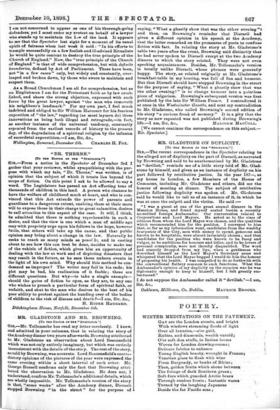"DR. THERNE."
(To THE EDITOR OF THE " EIPZOTATOR."]
Sin,—From a notice in the Spectator of December 3rd I gather that your reviewer, whilst sympathising with the pur- pose with which my tale, " Dr. Theme," was written, is of opinion that the subject of which it treats lies beyond the scope of fiction. On this point I ask to be allowed to say a word. The Legislature has passed an Act affecting tens of thousands of children in this land. A person who cbanoes to have the welfare of childhood much at heart, and who is con- vinced that this Act extends the power of parents and guardians to a dangerous extent, enabling them at their mere will to expose those in their charge to great calamities, desires to call attention to this aspect of the case. It will, I think, be admitted that there is nothing reprehensible in such a desire, and that the view is one which a man of middle age tray with propriety urge upon his fellows in the hope, however futile, that others will take up the cause, and that public opinion may bring about a change in the law. Naturally he seeks to reach as many minds as possitic, and in casting about to see how this can best be done, decides to make use of the vehicle of fiction, which gives him an opportunity of dealing with the law at work and of depicting disasters that may result in the future, as he sees those unborn events in the light of his own mind. Why should this method be con- demned as improper ? The writer may fail in his ends; his plot may be bad, his realisation of it feeble; these are different questions. But why—to take a single example— should the gates of fiction be open, as they are, to any one who wishes to preach a particular form of spiritual faith, or unfaith, and shut to the man who desires to the best of his poor ability to protest against the handing over of the bodies of children to the risk of disease and death ?—I am, Sir, Sec.,
H. RIDER HAGGARD.
Ditchinghom House, Norfolk, December 5th.










































 Previous page
Previous page